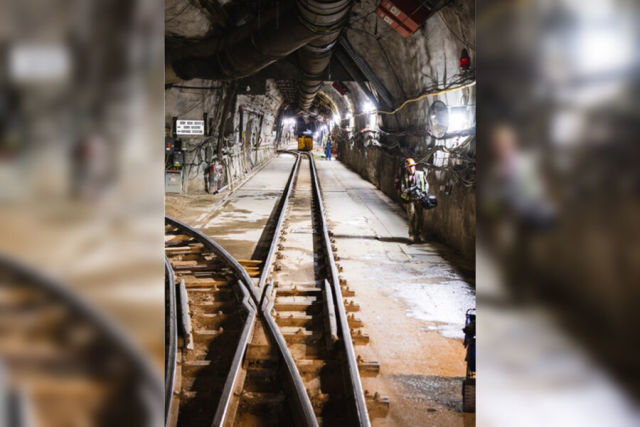Scientist Stefanovich: US nuclear tests are a signal for Russia
On October 18, the US National Nuclear Safety Administration conducted tests with a chemical explosion in an underground tunnel at a nuclear test site in Nevada. Their goal was to "improve the ability of the United States to detect low-power nuclear explosions around the world." The tests took place on the very day when the State Duma in the second and third readings adopted the law on revoking the ratification of the Comprehensive Nuclear Test Ban Treaty. Was it a coincidence - in the material of the "Newspaper.Ru».
On October 18, the US National Nuclear Safety Administration (NNSA) conducted tests with an underground chemical explosion "to reduce nuclear threats globally." This was reported by the American Ministry of Energy on its website.
Scientists from several scientific centers and laboratories of the country took part in the tests. As reported, the experiment allowed us to test new models for predicting explosions and algorithms for their detection.
"Such experiments advance our efforts to develop new technologies in support of U.S. nuclear nonproliferation goals. They will help reduce global nuclear threats by improving the detection of underground tests of nuclear explosive devices," commented Corey Hinderstein, Deputy head of the NNSA for Defense Nuclear Nonproliferation.
According to TASS, the United States intends to conduct two subcritical nuclear tests (experiments involving weapons components and materials in which a chain reaction does not occur) in fiscal year 2024[/i]. By the end of this decade, they plan to conduct three such experiments a year. These intentions do not contradict the Comprehensive Nuclear-Test-Ban Treaty (CTBT).
On September 10, 1996, the Comprehensive Nuclear-Test-Ban Treaty (CTBT) was adopted at the UN General Assembly. According to the document, the participants undertake not to produce nuclear explosions for civilian or military purposes in any place and to prevent them in their state and in controlled territories.
183 countries signed the agreement (India, Pakistan and the DPRK refused). 164 states have ratified the treaty, except the USA, China and Israel. In order for it to take effect, the consent and ratification of 44 countries that had nuclear capabilities and equipment at the time of the discussion is necessary. Since no agreement was reached, the agreement did not enter into force. However, countries have imposed a moratorium on nuclear explosions. Russia and the United States signed the treaty, but Moscow ratified it, and Washington did not.
"Blazes everywhere from this attitude"
The US conducted these tests on the day when the State Duma adopted the law on revoking the ratification of the CTBT in the second and third readings. 438 deputies voted in favor.
The deputies explained their decision by the "boorish attitude to the duties of maintaining global security" on the part of the United States, which has not ratified the document for more than 20 years.
"Think about it, they have not ratified this document for 23 years, and yesterday they woke up and remembered the deputies of the State Duma. They need to resign with such responsibility. Cynicism, double standards, blazes everywhere from this attitude. They fancied themselves hegemons, supporters of a unipolar world," said Vyacheslav Volodin, chairman of the State Duma.
The State Duma adopted the law after the words of President Vladimir Putin at a meeting of the Valdai Club that Moscow could withdraw the ratification of the treaty.
"I am not ready to say now whether we need to conduct tests or not, but to behave in a mirror manner in relations with the United States, when they signed, but did not ratify, and we signed and ratified - in principle, it is possible to behave in a mirror manner with the United States," the president said .
A signal for Russia
Bloomberg columnist Jonathan Tyrone notes that the tests were conducted legally, but cause concern because "they may be misinterpreted" and may lead to "a new arms race between nuclear powers."
"Given that Russia accuses the United States of preparing to conduct nuclear tests, and the United States accuses Russia of non-compliance with agreements, the parties should participate in discussions that will allow confidence-building measures to be taken," the agency quotes Daryl Kimball, executive director of the Arms Control Association.
The tests may lead to a further escalation of the conflict, says Pavel Podvig, senior researcher at the UN Institute for the Study of Disarmament Problems:
Dmitry Stefanovich, researcher at the IMEMO RAS Center for International Security and participant in projects under the auspices of the UN Institute for Disarmament Research, in an interview with Lenta.ru " admitted that what happened could be a signal to Russia about the impossibility of concealing potential nuclear tests in the future.
"However, there is no certainty yet that such tests are planned in principle, and if they are planned, they will be carried out without an appropriate information campaign to emphasize their importance in the interests of strengthening nuclear deterrence," the expert said.
In his opinion, the time of the experiment was hardly timed for the adoption of the law in the Russian Federation, such things are prepared in advance. A source close to the State Department confirmed to Kommersant that the explosion was planned "long before it became known that Russia could withdraw the ratification of the treaty."
Washington's reaction
The United States expressed concern after it became known about Russia's plans to withdraw the ratification of the CTBT, Reuters reported .
According to a source in the US department, Moscow needs to achieve an "equal position" with Washington, without resorting to "irresponsible nuclear rhetoric in unsuccessful attempts to coerce other states." He added that the American side considers the intention of the Russian Federation to cancel the ratification of the CTBT as a "way to increase pressure" on the United States and other countries to stop the supply of weapons and other assistance to Ukraine.
Alexey Permyakov

